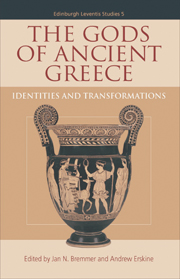Book contents
- Frontmatter
- Contents
- Preface
- List of Illustrations
- Notes on Contributors
- List of Abbreviations
- Introduction: The Greek Gods in the Twentieth Century
- 1 What is a Greek God?
- PART I SYSTEMATIC ASPECTS
- PART II INDIVIDUAL DIVINITIES AND HEROES
- PART III DIACHRONIC ASPECTS
- 14 Early Greek Theology: God as Nature and Natural Gods
- 15 Gods in Early Greek Historiography
- 16 Gods in Apulia
- 17 Lucian's Gods: Lucian's Understanding of the Divine
- 18 The Gods in the Greek Novel
- 19 Reading Pausanias: Cults of the Gods and Representation of the Divine
- 20 Kronos and the Titans as Powerful Ancestors: A Case Study of the Greek Gods in Later Magical Spells
- 21 Homo fictor deorum est: Envisioning the Divine in Late Antique Divinatory Spells
- 22 The Gods in Later Orphism
- 23 Christian Apologists and Greek Gods
- 24 The Materiality of God's Image: Olympian Zeus and Ancient Christology
- PART IV HISTORIOGRAPHY
- Epilogue
- Index
15 - Gods in Early Greek Historiography
from PART III - DIACHRONIC ASPECTS
Published online by Cambridge University Press: 05 August 2013
- Frontmatter
- Contents
- Preface
- List of Illustrations
- Notes on Contributors
- List of Abbreviations
- Introduction: The Greek Gods in the Twentieth Century
- 1 What is a Greek God?
- PART I SYSTEMATIC ASPECTS
- PART II INDIVIDUAL DIVINITIES AND HEROES
- PART III DIACHRONIC ASPECTS
- 14 Early Greek Theology: God as Nature and Natural Gods
- 15 Gods in Early Greek Historiography
- 16 Gods in Apulia
- 17 Lucian's Gods: Lucian's Understanding of the Divine
- 18 The Gods in the Greek Novel
- 19 Reading Pausanias: Cults of the Gods and Representation of the Divine
- 20 Kronos and the Titans as Powerful Ancestors: A Case Study of the Greek Gods in Later Magical Spells
- 21 Homo fictor deorum est: Envisioning the Divine in Late Antique Divinatory Spells
- 22 The Gods in Later Orphism
- 23 Christian Apologists and Greek Gods
- 24 The Materiality of God's Image: Olympian Zeus and Ancient Christology
- PART IV HISTORIOGRAPHY
- Epilogue
- Index
Summary
This chapter seeks to understand something of Herodotus' attitude towards the gods, both by examining his text for internal indications and by comparing the practice of other early writers. There have been, to be sure, many excellent studies of Herodotus' gods, and his religion. In general one may study Herodotus' text either to discover evidence of religious practice and belief, or to assess the role of the gods in the Histories themselves. The second of these is the primary focus here, but more than the usual point that the gods are deeply implicated in the course of history, in various interesting ways, I wish to stress that they are also deeply implicated in the historiography, and linked to Herodotus' most basic conception of his task.
Herodotus, after all, did not have to work the gods into his explanation of historical events. Living not much later, Thucydides excluded them; in the next generation the pious Xenophon put them back in. Ctesias cheerfully gives Semiramis the divine mother and fabulous biography Herodotus had passed over in silence. These differences show that we are dealing with individual preference, not (as it was once popular to suppose) evolution from superstition to reason, from mythos to logos. In Herodotus' own day Sophists were busy finding anthropocentric ways of explaining the world. Herodotus could have told a secular story, but he did not.
- Type
- Chapter
- Information
- The Gods of Ancient GreeceIdentities and Transformations, pp. 318 - 334Publisher: Edinburgh University PressPrint publication year: 2010

